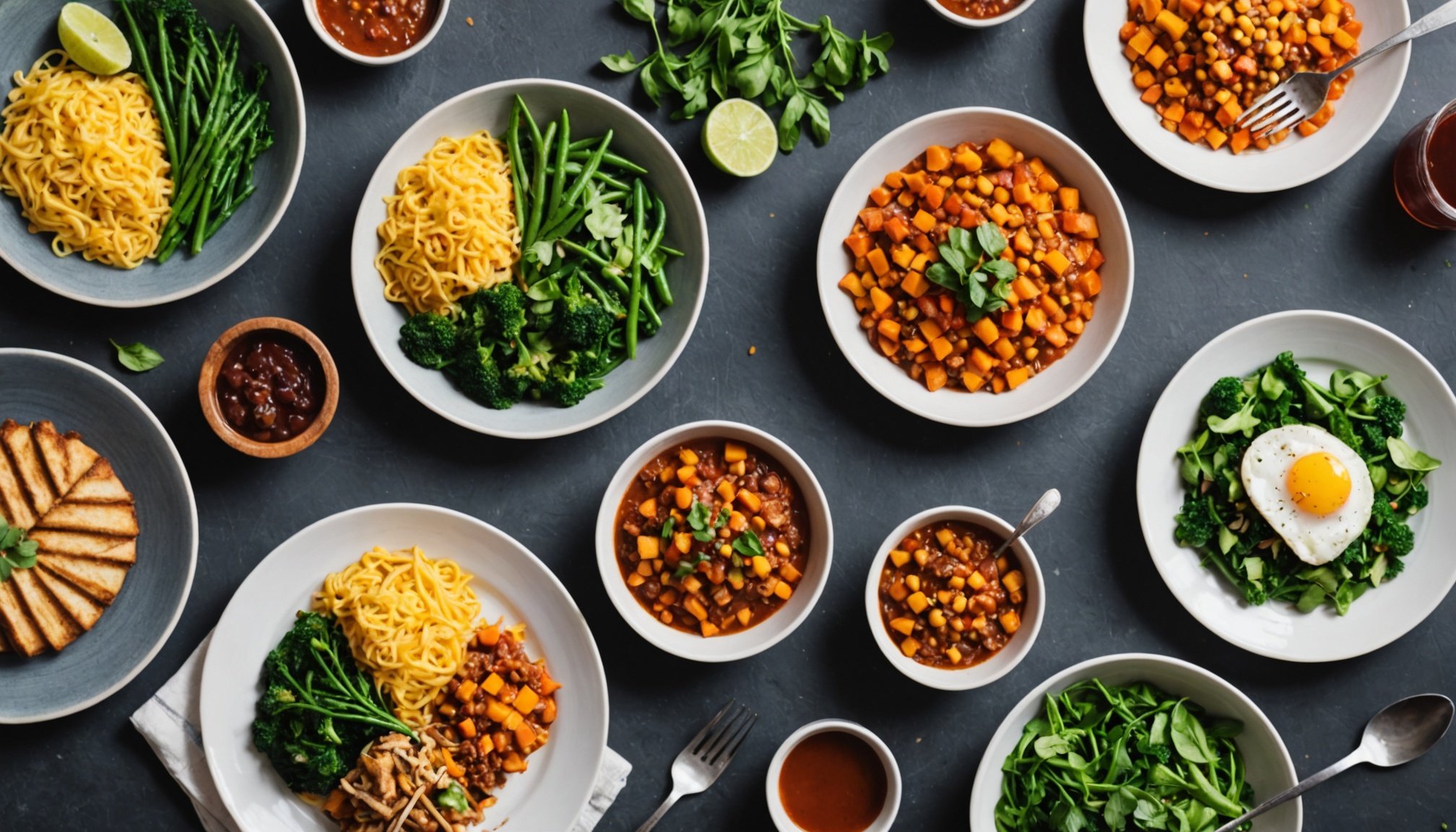Transforming Family Meals: Creative Ways for UK Households to Embrace More Plant-Based Dining Each Week
In the heart of British cuisine, the traditional roast dinner and other hearty meals have long been staples, but there is a growing movement towards a more plant-based diet. This shift is driven by a combination of health, environmental, and economic benefits. Here’s how UK households can creatively incorporate more plant-based meals into their weekly routines.
The Health Benefits of a Plant-Based Diet
A plant-based diet is increasingly recognized for its numerous health benefits. Health professionals across the UK are urging the NHS to adopt plant-based menus, citing the overwhelming evidence that such diets can improve health outcomes and address health inequalities[2][3].
Topic to read : Crafting a Green Fitness Journey: UK Residents” Guide to Establishing an Eco-Friendly Home Workout Routine
“Plant-based meals can have direct health benefits,” notes the letter from the Plants First Healthcare Campaign. “By encouraging a higher consumption of fruit, vegetables, whole grains, and legumes, we can reduce the prevalence of heart disease, high blood pressure, type 2 diabetes, obesity, and certain cancers.”
Here are some key health benefits associated with a plant-based diet:
In the same genre : Essential Dietary Strategies for British Diabetics: Mastering Glycemic Control Safely
- Reduced Risk of Heart Disease: Plant-based diets are rich in fiber, vitamins, and minerals, and low in saturated fats, which can help lower cholesterol levels and blood pressure.
- Weight Management: Plant-based foods tend to be lower in calories and higher in fiber, making it easier to maintain a healthy weight.
- Lower Risk of Chronic Diseases: Diets rich in fruits, vegetables, and whole grains have been linked to a reduced risk of type 2 diabetes, certain cancers, and other chronic diseases.
- Improved Gut Health: A diet high in fiber from plants can promote a healthy gut microbiome.
Creative Plant-Based Meal Ideas for the Family
Transitioning to a more plant-based diet doesn’t have to be boring or restrictive. Here are some creative and delicious meal ideas that the whole family can enjoy:
Vegan Roast Dinner
The traditional British roast dinner can easily be veganized. Instead of using meat, consider alternatives like tofu, tempeh, or seitan, marinated in a mixture of herbs and spices. Roasted vegetables such as Brussels sprouts, carrots, and parsnips can be the centerpiece of the meal. Abi Saddington, a proponent of veganizing the roast dinner, emphasizes the simplicity and inclusivity of such meals[1].
Plant-Based Meal Prep
Meal prep is a great way to ensure you have healthy, plant-based meals ready throughout the week. Here are some ideas:
- Vegan Stir-Fries: Prepare a batch of stir-fry ingredients like bell peppers, broccoli, and tofu, and cook them in a wok with some oil and your favorite seasonings.
- Lentil Soups: Cook lentils with vegetables and spices to make a hearty and nutritious soup that can be reheated throughout the week.
- Quinoa Salads: Mix cooked quinoa with chopped vegetables, nuts, and seeds, and add a tangy dressing for a quick and easy meal.
Zero Waste Recipes
Reducing food waste is another aspect of adopting a healthy and sustainable food strategy. Here are some zero waste recipes that make the most of your ingredients:
- Spicy Baked Cauliflower Wings: Use the entire cauliflower, including the leaves, to make a delicious and crunchy snack[4].
- Fridge-Raid Fried Rice: Combine leftover cooked rice with any vegetables that need using up, along with some eggs and seasonings, for a quick and satisfying meal[4].
- Thai Curry Noodle Soup: Transform leftover vegetables into a spicy and creamy curry with some Thai green curry paste and noodles[4].
Economic and Environmental Benefits
Adopting a plant-based diet is not only good for your health but also for your wallet and the environment.
Cost Savings
A plant-based diet can be more cost-effective than a diet heavy in meat and animal products. According to estimates, if England were to adopt a completely plant-based diet, the NHS could see a total net benefit of around £18.8 billion per year[2].
Environmental Impact
Food production is a significant contributor to greenhouse gas emissions, with animal agriculture being a major culprit. By shifting towards plant-based meals, households can significantly reduce their carbon footprint. For instance, a ‘Plant-Based by Default’ menu in New York City’s public hospitals led to a 36% reduction in carbon emissions and cost savings of 59 cents per meal[3].
Practical Tips for a Smooth Transition
Transitioning to a more plant-based diet can seem daunting, but with some practical tips, it can be a smooth and enjoyable process.
Start Small
Begin by substituting one or two meals a week with plant-based options. Gradually increase the number of plant-based meals as you become more comfortable with new recipes and ingredients.
Explore New Ingredients
Don’t be afraid to try new fruits, vegetables, grains, and legumes. Visit local farmers’ markets or join a community-supported agriculture (CSA) program to discover fresh and seasonal produce.
Involve the Family
Make cooking a family affair. Let everyone contribute to meal planning and preparation. This can help ensure that everyone is on board with the new diet and can also be a fun bonding experience.
Seek Inspiration
Follow vegan and plant-based food bloggers, chefs, and influencers for recipe ideas and cooking tips. Tim Spector, a gut health guru, and other experts often share insights and recipes that can inspire your meal plans[3].
Community and Cultural Aspects
Embracing a plant-based diet is not just about individual health but also about community and cultural shifts.
Community Support
Join local vegan or plant-based groups to connect with others who share your dietary preferences. These communities often share recipes, cooking tips, and support each other in their dietary journeys.
Cultural Adaptations
Traditional British food can easily be adapted to be more plant-based. For example, a vegan full English breakfast can include tofu scramble, roasted tomatoes, and mushrooms instead of bacon and eggs.
Transforming family meals to include more plant-based options is a journey that offers numerous benefits for health, the environment, and the economy. By starting small, exploring new ingredients, and involving the family, households can make this transition enjoyable and sustainable.
Here is a summary of the key points to consider:
| Aspect | Benefits | Examples |
|---|---|---|
| Health | Reduced risk of heart disease, weight management, lower risk of chronic diseases | Vegan roast dinner, lentil soups, quinoa salads |
| Economy | Cost savings, reduced NHS costs | Plant-Based by Default menus, zero waste recipes |
| Environment | Reduced carbon footprint, lower emissions | Plant-Based by Default menus, local and seasonal produce |
| Community | Community support, cultural adaptations | Joining local vegan groups, adapting traditional British food |
| Practical Tips | Start small, explore new ingredients, involve the family | Meal prep, zero waste recipes, seeking inspiration from experts |
In the words of Shireen Kassam, a consultant haematologist at King’s College Hospital London, “When staff and patients are made aware of the health and climate benefits of plant-based meals, they are supportive of incorporating more lower-carbon, health-promoting foods.” By embracing more plant-based dining, UK households can make a significant impact on their health, the environment, and the community, all while enjoying delicious and varied meals.











